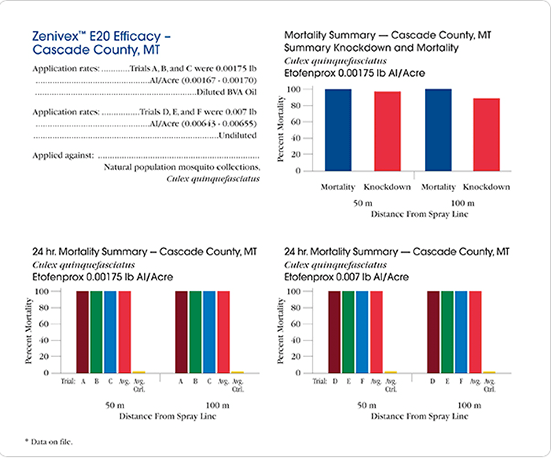FIELD TESTS
ZENIVEX® MOSQUITO ADULTICIDE FIELD TESTED – MOSQUITO READYEfficacy trials for Zenivex® E20 have been very successful at all label rates — 0.00175, 0.0035, and 0.007 lb A.I. per acre. More than 30 tests have been conducted at locations throughout the Northeast, Southeast, South and the Western United States on a variety of mosquito species* including:
- Aedes aegypti
- Culex pipiens
- Aedes albopictus
- Culex quinquefasciatus
- Aedes dorsalis
- Culex tarsalis
- Aedes melanimon
- Culiseta melanura
- Aedes vexans
- Ochlerotatus nigromaculis
- Anopheles crucians
- Ochlerotatus salinarius
- Anopheles quadrimaculatus
- Ochlerotatus sollicitans
- Coquillettidia sp.
- Ochlerotatus taeniorhychus
- Culex nigripalpus
Efficacy charts from tests in Cascade County, Montana; Fallon, Nevada; Georgetown, South Carolina; and Manatee County, Florida are available.
Resident Frequently Asked Questions
COMMUNITY RELATIONSWhen it comes to threats of mosquito-borne diseases, communities look to local leaders for action and information. A quality community relations program allows mosquito abatement districts and public health officials to educate the public, keeping them aware of programs and treatments to ensure their safety.
-
Why are you spraying our community for mosquitoes?Mosquito populations are controlled with integrated programs that focus on breeding habitats and control of the adult mosquito. When mosquitos populations increase or when mosquito-borne diseases are present, experts in the field determine when spraying an adulticide is the best way to control the adults that can carry mosquito-borne diseases.
-
What is a mosquito-borne disease?A mosquito–borne disease is a disease transmitted through a mosquito bite. Female mosquitoes feed on humans, birds, mammals, and other animals for the protein they need to reproduce. When they do, they can transfer diseases such as West Nile virus, malaria, yellow fever, dog heartworm and viral encephalitis. Mosquito-borne diseases are among the world's leading causes of illness and death. For more information about these specific illnesses, view the disease information page.
-
Why do you spray after dusk or before dawn?Most mosquitoes are active just after dusk and right before dawn. These times offer the best opportunity to reach active mosquitoes and achieve the most coverage for decreasing the adult mosquito population.
-
What are you spraying?Zenivex® adulticide is highly effective and the only mosquito adulticide product that is classified as reduced risk by the Environmental Protection Agency (EPA). The product delivers a molecule called Etofenprox in a formulation that does not require any synergist such as a PBO to enhance its efficacy.
-
Does Zenivex® adulticide pose a risk to humans?The active ingredient in Zenivex® adulticide has been tested and approved through the EPA for use in outdoor residential and recreational areas. It is the only mosquito adulticide on the market today that has received a reduced risk classification from the EPA. The product also has a low toxicity profile for mammals, avians and plants.
-
What can I (the consumer) do?
Everyone can help control mosquitoes. By minimizing the amount of standing water around the home and community, families can significantly reduce mosquito populations.
- Turn over pails, planters or anything that can hold stagnant water, allowing mosquitoes to breed.
- Treat standing water in ornamental ponds, birdbaths, gutters and pool covers with a larvicide.
- Remove litter from your yard. Mosquitoes can lay eggs in small, discarded items that hold water such as cans, bottles and wrappers.






